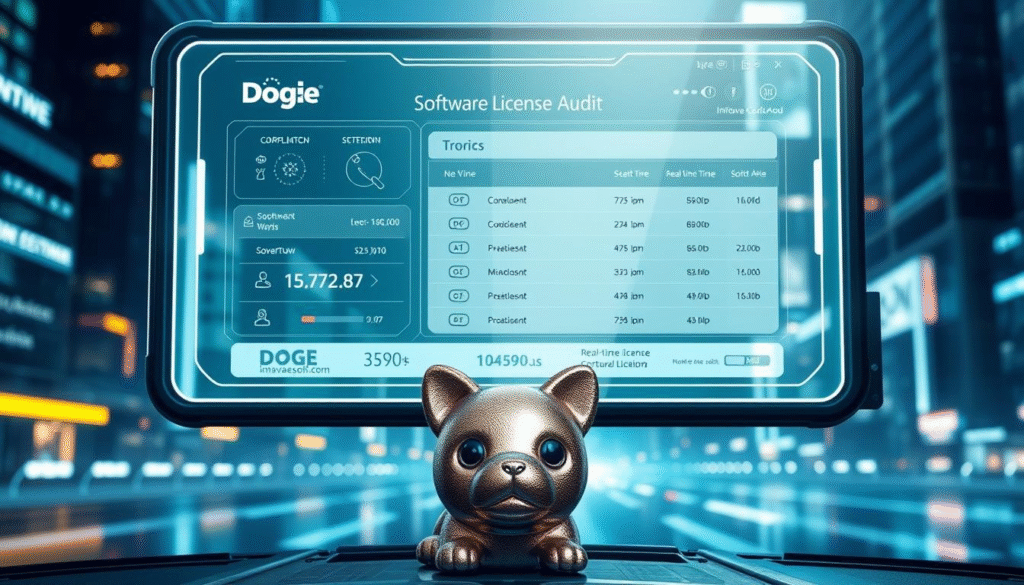Software licensing has become a cornerstone of responsible development and distribution. With organizations relying heavily on open-source libraries, third-party packages, and commercial software, the task of ensuring compliance has grown increasingly complex. The Doge Software Licenses Audit HUD offers a modern, real-time solution that empowers both developers and business leaders to maintain control and transparency over their software licenses.
Quick Summary
🔍 Real-time scanning of software licenses across codebases
⚖️ License compatibility matrix to spot potential conflicts
🛡️ Custom policy enforcement to prevent non-compliance
📄 Audit-ready reports for legal and certification needs
⚙️ Seamless integration with developer tools and workflows
Understanding Doge Software Licenses Audit HUD
The Doge Software Licenses Audit HUD is a continuous monitoring tool presented through a heads-up display interface. It scans codebases to detect and classify all associated licenses, working across popular ecosystems like NPM, PyPI, and Maven. By pulling license information from manifests and source files, it provides a clear, organized view of licensing status. This is supplemented with a compatibility matrix and customizable policy enforcement features.
Why Licensing Audits Are Essential
Licensing audits protect organizations from legal risks, operational delays, and financial loss. Without regular checks, a single incompatible or restrictive license could halt a release or result in costly remediation. Developers often introduce such risks unknowingly, and manual reviews are too slow for fast-paced development cycles. Real-time auditing prevents these problems before they escalate.
Key Features of the HUD
- Real-Time Scanning: Automatically identifies licenses in code and dependencies as they are introduced.
- Compatibility Matrix: Highlights potential conflicts between license types.
- Policy Engine: Enforces rules for allowed, restricted, or prohibited licenses.
- Comprehensive Reports: Generates audit-ready documentation for compliance reviews.
- Integrations: Connects with GitHub, Jenkins, VS Code, Snyk, and more to fit seamlessly into workflows.

Benefits for Developers and Businesses
For developers, the HUD delivers instant alerts, preventing compliance issues from becoming last-minute blockers. Businesses gain reduced legal exposure, faster audit preparation, and improved governance. Continuous monitoring fills the gap between scheduled audits, and detailed reports provide confidence during mergers, acquisitions, or security certifications.
Who Gains the Most from Doge HUD
- Startups: Ensure clean licensing before investor or acquisition evaluations.
- Enterprises: Apply organization-wide policies through CI/CD pipelines.
- Non-Profits: Meet grant requirements without excessive manual work.
- Government Contractors: Maintain strict compliance to meet procurement standards.
Real-World Use Cases
A SaaS provider used the HUD to discover GPL dependencies that could have forced them to open-source proprietary components. By replacing them early, they avoided legal complications. A healthcare software vendor passed a compliance audit in minutes by producing HUD reports. A non-profit reduced costs by replacing a paid library with a free, compatible alternative revealed by the HUD.
Linking to Software Asset Management
The Doge HUD complements broader Software Asset Management (SAM) strategies. While SAM tools track procurement and usage, the HUD focuses specifically on licensing compliance. This ensures every software component aligns with established policies and legal obligations throughout its lifecycle.
Implementation Recommendations
Start small with a pilot project to fine-tune license policies. Collaborate with legal teams to define clear guidelines. Enable automated alerts to block non-compliant code before deployment. Review and update policies regularly to reflect evolving business goals and regulations.
Beyond Compliance
Beyond legal safety, the HUD offers strategic advantages. It can identify cost-saving opportunities, speed up decision-making, and strengthen an organization’s position during negotiations. Its approachable design encourages adoption across technical and non-technical teams alike.
Conclusion
The Doge Software Licenses Audit HUD bridges the gap between rapid software development and strict compliance requirements. By delivering continuous, actionable insights, it helps organizations prevent costly errors and operate with confidence. In a world where software ecosystems grow more complex every day, tools like the Doge HUD are becoming indispensable for sustainable, compliant innovation.
FAQs
What is the Doge Software Licenses Audit HUD?
It’s a real-time dashboard that scans and monitors software licenses in your codebase to ensure compliance.
Who should use the HUD?
Startups, enterprises, non-profits, and government contractors can all benefit from its compliance and reporting features.
How does it integrate into workflows?
It connects with tools like GitHub, Jenkins, and VS Code for instant feedback and policy enforcement.
Can it help with cost savings?
Yes. By identifying redundant or expensive software, it can guide teams toward cost-effective alternatives.
Is it suitable for ongoing compliance?
Absolutely. Continuous monitoring ensures compliance between formal audits, reducing risk at every stage.










